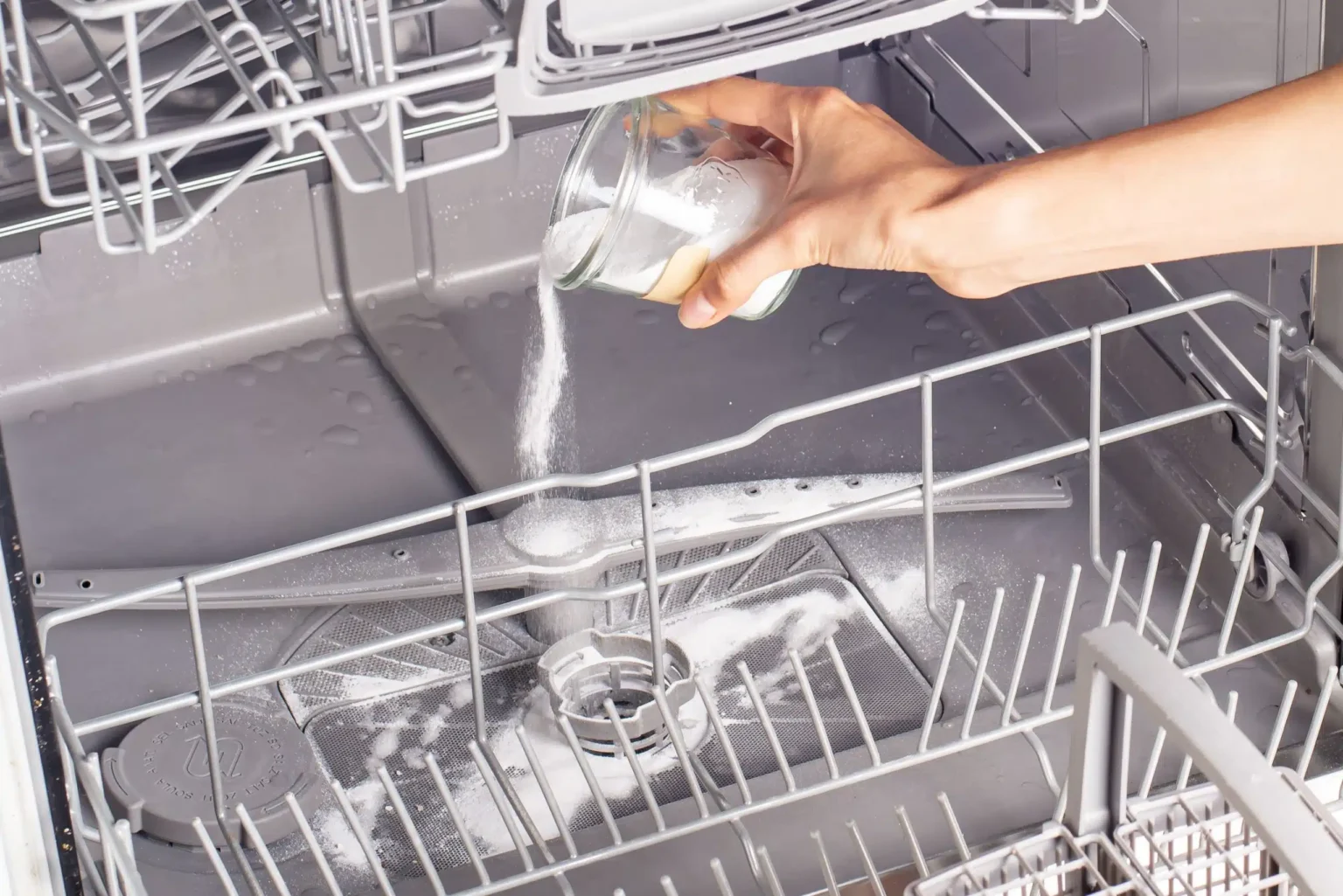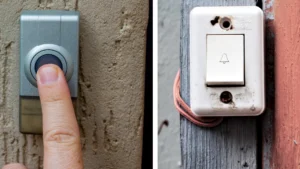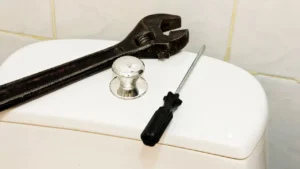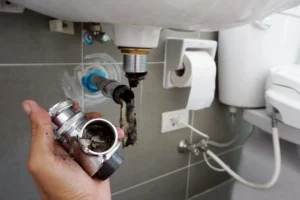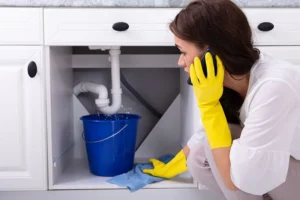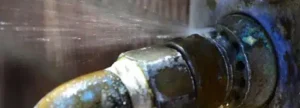Is your dishwasher leaving dishes dirty or smelly? Over time, food bits, grease, and limescale can build up inside it. A good cleaning routine keeps your machine running its best. Stick around—cleaning it is easier than you think!
How Often Should You Clean Your Dishwasher?
Clean your dishwasher regularly to keep it running smoothly. Remove visible food bits daily or after each load. This prevents clogs and bad smells. Wipe down the edges, gasket, and clean the filter weekly to stop grime build-up.
Deep-clean monthly by running a vinegar cleaning cycle. Sprinkle baking soda for extra freshness if needed. For heavy use or odd smells, deep clean every three months—or sooner! A little routine care saves you bigger headaches later.
Steps to Clean the Inside of a Dishwasher
A dirty dishwasher is like washing dishes with muddy water—gross, right? Follow these simple steps to make it sparkle again.
Remove and clean the filter
Find the filter below the bottom spray arm. Twist and lift it out, as shown in your owner’s manual. Food scraps often gather there, so don’t skip this step.
Rinse the filter under hot water to wash off grease and debris. Use a soft toothbrush for stubborn bits stuck in crevices. After cleaning, lock it firmly back into place before using your dishwasher again.
Clear out food debris and residue
Check the dishwasher’s bottom after each cycle. Use your fingers or a paper towel to remove food bits stuck there. This stops clogs and cuts bad smells.
Scrape plates before loading them in. Keep labels off jars too, as they can cause blockages. Clean small gaps with a toothbrush if needed for spotless results!
Use vinegar for a cleaning cycle
Place a dishwasher-safe bowl with 1 cup of distilled white vinegar on the top rack. Choose the pots-and-pans or heavy cycle and run it without detergent or dishes inside.
This cleans grease, mineral buildup, and odours naturally. Vinegar acts as a strong yet safe natural dishwasher cleaner. It reaches every corner during the wash for a thorough job.
Sprinkle baking soda for deodorising
Sprinkle 1 cup of baking soda on the bottom of your empty dishwasher. Run a quick cycle using hot water. This trick fights bad smells and keeps things fresh. Baking soda also tackles leftover grease or grime, leaving your dishwasher smelling clean.
No need for fancy cleaners! Baking soda is natural, cheap, and safe for regular use. It works well with vinegar from the earlier step to deep clean dishwashers naturally. Keep your machine odour-free after every clean with this simple step!
How to Clean the Outside of a Dishwasher
A spotless dishwasher isn’t just about the inside, the outside matters too. Keep it shining by giving attention to every surface, big or small!
Wipe the door and control panel
Clean the door, edges, handle, and control buttons using a damp microfiber cloth or sponge. Pay special attention to sticky spots on the control panel. Use gentle wipes to avoid pressing too hard on sensitive buttons.
For dispensers, use a damp paper towel or cloth to remove undissolved detergent or debris. Keep everything dry after cleaning to stop water stains.
Clean the door gasket
Scrub the rubber door gasket with a soft toothbrush. Dip it in warm, soapy water or mild all-purpose cleaner first. Focus on folds and grooves where grime hides. Make sure to remove any trapped dirt or food bits.
Wipe the edges of the dishwasher door weekly too. Use a damp cloth to keep the seal fresh and clean. A clean gasket helps prevent odours and keeps your dishwasher running well longer.
Can You Use Bleach or Vinegar for Deep Cleaning?
Bleach is not safe for dishwashers. It can damage stainless steel interiors and rubber parts. Bleach exposure may also release harmful fumes when mixed with detergent.
Vinegar works great for deep cleaning a dishwasher. Place 1 cup of distilled white vinegar in a dishwasher-safe bowl on the top rack. Run it on a heavy or pots-and-pans cycle using hot water.
Tips for Maintaining a Clean Dishwasher
Keep your dishwasher running smoothly with a bit of regular care. Small habits can stop big problems before they start.
Run hot water cycles regularly
Hot water loosens grease, food particles, and detergent residue. Run a hot cycle at least once every month to prevent build-up. Use a commercial dishwasher cleaner like Finish Dishwasher Cleaner for better results during these cycles.
Set your machine to 60°C or higher for effective cleaning. High heat also kills bacteria and keeps nasty smells away. This simple habit can extend the life of your dishwasher while keeping dishes sparkling clean.
Check and clean spray arms
Spray arms spray water to clean dishes. Food bits often block the tiny holes, stopping water flow. Turn each arm and look for clogs or dirt buildup.
Use a toothpick or wire to clear trapped debris from the holes. Rinse under warm water to remove any remaining grime. Clean spray arms stop bacteria and mould growth in your dishwasher.
Avoid overloading the dishwasher
Stuffing every plate and cup into the dishwasher isn’t a good idea. Overloading blocks the spray arms, stopping water from reaching all items. Dishes may come out dirty, forcing you to wash them again—a waste of time, energy, and detergent.
Arrange dishes so nothing touches or overlaps too much. Always scrape off large food bits before loading but skip pre-rinsing—modern dishwashers handle tough grime well. This keeps your machine running smoother and prevents clogs in the filter.
Conclusion
A clean dishwasher means cleaner dishes and a happier kitchen. Stick to simple steps like using vinegar, baking soda, and checking the filter often. Care for your machine regularly, so it lasts longer and performs better.
Don’t let grime take over—your dishwasher deserves a little TLC too! Cleaning it doesn’t have to be hard; just keep at it.
FAQs
How do you clean a dishwasher with vinegar?
Pour one cup of vinegar into a dishwasher-safe bowl and place it on the top rack. Run a hot water cycle to remove grease, odours, and grime.
What’s the best way to deep clean a dishwasher?
Remove racks and filters, scrub them gently, then use baking soda or vinegar in an empty wash cycle. Clean the drain as well for thorough maintenance.
How can I keep my dishwasher clean daily?
Scrape food bits off dishes before loading them. Use rinse aid regularly, check for blockages in the drain, and wipe down seals after each run.
Where should I pour vinegar when cleaning my dishwasher?
Place it in a bowl on the top rack rather than pouring directly into any compartments or drains.
Can baking soda help with cleaning dishwashers?
Yes! Sprinkle some at the bottom of your machine after using vinegar for extra freshness and stain removal during another short cycle.
Do homemade cleaners work well for dishwashers?
Absolutely! Vinegar and baking soda are great natural options that cut through dirt without harsh chemicals like commercial products often contain.

